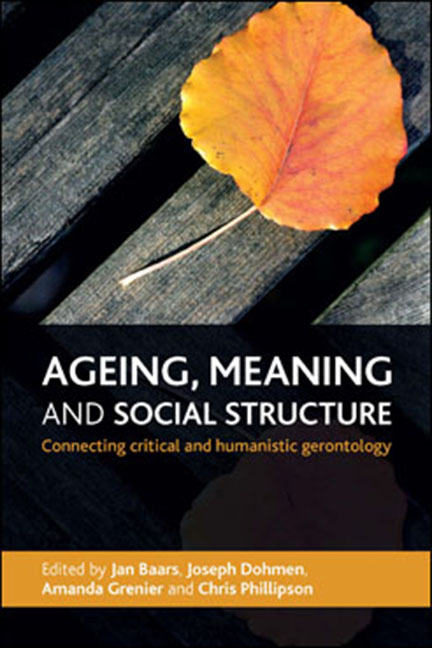Book contents
- Frontmatter
- Contents
- Notes on contributors
- Acknowledgements
- one Introduction
- two Connecting meaning with social structure: theoretical foundations
- three My own life: ethics, ageing and lifestyle
- four Rethinking agency in late life: structural and interpretive approaches
- five Dementia: beyond structures of medicalisation and cultural neglect
- six Self-realisation and ageing: a spiritual perspective
- seven Social ability or social frailty? The balance between autonomy and connectedness in the lives of older people
- eight Critical perspectives on social work with older people
- nine Community-based participatory action research: opportunities and challenges for critical gerontology
- ten Commentary: contingent ageing, naturalisation and some rays of intellectual hope
- Index
six - Self-realisation and ageing: a spiritual perspective
Published online by Cambridge University Press: 07 September 2022
- Frontmatter
- Contents
- Notes on contributors
- Acknowledgements
- one Introduction
- two Connecting meaning with social structure: theoretical foundations
- three My own life: ethics, ageing and lifestyle
- four Rethinking agency in late life: structural and interpretive approaches
- five Dementia: beyond structures of medicalisation and cultural neglect
- six Self-realisation and ageing: a spiritual perspective
- seven Social ability or social frailty? The balance between autonomy and connectedness in the lives of older people
- eight Critical perspectives on social work with older people
- nine Community-based participatory action research: opportunities and challenges for critical gerontology
- ten Commentary: contingent ageing, naturalisation and some rays of intellectual hope
- Index
Summary
Introduction
This chapter looks at the relevance of perspectives on spirituality and ageing in relation to self-realisation in later life. First, it outlines individualisation processes, the corresponding rise of individual self-realisation as a cultural and moral ideal, and the implications of these developments for ageing individuals. Second, the ethical-philosophical concept of self-realisation and views about the nature of the self are discussed. Third, the chapter examines how perspectives on spirituality and ageing can contribute to our understanding of the subject of self-realisation in late modernity. The argument developed here holds that spiritual perspectives within gerontology, such as those advanced by Thomas Cole (1992), Lars Tornstam (2005) and Robert Atchley (2009), raise important issues about self-realisation in later life.
Individualisation, self-realisation and ageing in late modernity
Giddens (1991) has argued that the contemporary condition is most accurately described as ‘late’ or ‘reflexive’ modernity. These terms suggest that modernity is not so much ‘over’ (as the term ‘postmodern’ would imply), but has developed into a specific form that is to be distinguished from the common or ‘massive’ modernity that characterised the previous era (Baars, 2006a). Late modernity represents a post-traditional order that is full of uncertainties and insecurities. People are confronted with endless and multiple options and possibilities that require constant and reflexive choice. Reflexivity, in this respect, points to the fact that almost all aspects of people's lives are susceptible to revision in the light of new information or knowledge. Individuals are forced to continuously negotiate their own lifestyle among these choice options, and thereby create and structure their self-identity. This process takes place against the backdrop of the pervasive social and institutional structures of modernity that influence processes of identity building (Giddens, 1991).
Individualisation can be seen as one of the tendencies most intimately connected to modernisation processes in general. For Beck and Beck-Gernsheim (2002), individualisation brings together two interrelated dimensions. First, the disintegration of previously existing, traditional social forms: old modes of life that were ordained by religion, tradition or the state are breaking down and people are no longer defined by traditional social categories such as class, gender or age.
- Type
- Chapter
- Information
- Ageing, Meaning and Social StructureConnecting Critical and Humanistic Gerontology, pp. 97 - 118Publisher: Bristol University PressPrint publication year: 2013



